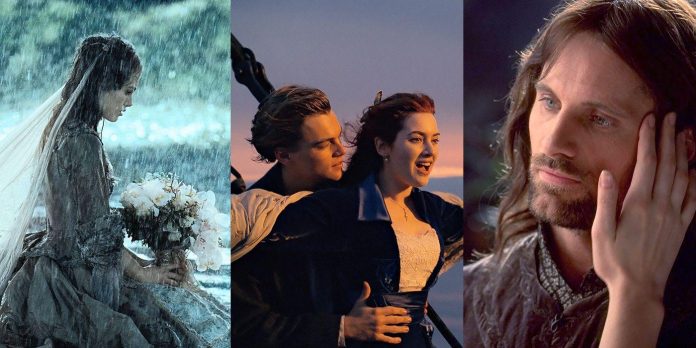In the vast, ever-evolving tapestry of cinema, certain films stand as eternal beacons, illuminating the path for both the casual viewer and the devoted cinephile. These masterpieces, curated with precision and passion, transcend mere entertainment to become essential touchstones in the landscape of film history. “” is an exploration into the heart of these iconic works, each frame a testament to the artistry and vision that define the medium. This article delves into the narratives, techniques, and cultural impacts that render these films indispensable for any true aficionado. With an authoritative lens, we unravel the timeless allure of these cinematic gems, inviting you to journey through the annals of filmic excellence and rediscover the enduring power of storytelling in its most sublime form.
Timeless Narratives: Exploring the Artistry Behind Cinematic Masterpieces
The world of cinema offers a treasure trove of experiences that captivate the imagination and transcend time. At the heart of these experiences are films that stand as pillars of storytelling, each a testament to the power of visual narrative. These are not just movies; they are artistic endeavors that resonate across generations, offering insights into the human condition. For the discerning aficionado, several films emerge as essential viewing, each contributing to the rich tapestry of cinematic history. These masterpieces are not only defined by their compelling plots but also by their groundbreaking direction, innovative cinematography, and unforgettable performances.
- Citizen Kane – Often heralded as the greatest film ever made, this Orson Welles masterpiece revolutionized narrative structure and cinematic technique.
- The Godfather – A magnum opus in storytelling, this epic saga of crime and family is both a cultural phenomenon and a study in character complexity.
- 2001: A Space Odyssey – Stanley Kubrick’s visionary exploration of humanity and technology pushes the boundaries of what film can achieve.
- Casablanca - With its iconic dialogue and timeless romance, this classic remains a beloved staple in the canon of film history.
- Schindler’s List – Steven Spielberg’s haunting depiction of the Holocaust is a powerful reminder of cinema’s ability to educate and evoke deep emotion.
These films, among others, serve as a profound reflection of the artistry and dedication involved in crafting narratives that endure. They are essential for any film lover seeking to understand the evolution and impact of cinematic storytelling. As you explore these eternal frames, you immerse yourself in a world where each scene is a carefully painted stroke on the canvas of human experience.
Unveiling the Craft: Directors Who Redefined the Film Landscape
In the grand tapestry of cinema, certain directors have emerged as master weavers, their unique visions and innovative techniques reshaping the way stories are told on the silver screen. Alfred Hitchcock, often hailed as the “Master of Suspense,” introduced audiences to a psychological depth and tension that forever changed the thriller genre. His meticulous attention to detail and pioneering camera work have left an indelible mark on the art of filmmaking. Meanwhile, Akira Kurosawa, with his epic narratives and dynamic compositions, brought the aesthetics of Japanese cinema to a global stage, influencing directors across continents with films like Seven Samurai and Rashomon.
Ingmar Bergman challenged audiences to explore the profound complexities of the human psyche through his existential narratives, pushing the boundaries of storytelling with films that delved into themes of mortality and identity. In a similar vein, Federico Fellini expanded the realm of visual storytelling with his surreal and flamboyant style, blending fantasy and reality in a way that remains unparalleled. These visionary directors, among others, have not only crafted timeless masterpieces but have also paved the way for future generations of filmmakers, leaving behind a legacy of innovation and inspiration. Their works continue to be essential viewing for any true cinephile, offering a masterclass in the art of directing.
Visual Poetry: Cinematography that Captures the Soul of Cinema
In the realm of visual storytelling, certain films transcend the boundaries of conventional cinema, transforming into a tapestry of artistic expression that resonates deeply with the viewer. These cinematic masterpieces are not merely stories told through moving images, but rather visual poems that evoke profound emotions and philosophical reflections. Their cinematography is not just a tool for narration but a powerful medium that captures the very essence of the human experience.
- Chiaroscuro Mastery: The interplay of light and shadow, as seen in films like Citizen Kane and The Godfather, creates a visual tension that mirrors the complexity of their narratives.
- Color as Emotion: The vibrant palettes of In the Mood for Love and Amélie transform color into a character of its own, guiding viewers through a spectrum of emotions.
- Symphonic Composition: The symphonic marriage of imagery and sound in 2001: A Space Odyssey and Blade Runner creates an immersive experience that lingers long after the credits roll.
- Fluid Motion: The continuous, flowing camera movements in films like Birdman and Children of Men encapsulate the seamless progression of time and space, drawing audiences into a dance of visual storytelling.
These films serve as a testament to the power of cinematography to not only tell stories but to etch them into the soul of the audience. They invite cinephiles to explore the intricate layers of visual language, where every frame is a brushstroke on the canvas of cinema.
Must-Watch Classics: Films That Every Aficionado Should Experience
Embark on a journey through the annals of cinematic history with these indelible masterpieces that have shaped the art of filmmaking. Timeless and evocative, these films transcend the screen, offering a glimpse into the brilliance of storytelling and visual poetry. Here are a few gems that every true cinephile must experience:
- Casablanca (1942): A riveting tale of love and sacrifice set against the backdrop of World War II, where every glance and whispered word speaks volumes.
- Citizen Kane (1941): Often hailed as the greatest film ever made, this cinematic tour de force is a deep dive into the complexities of power and legacy.
- The Godfather (1972): A saga of family and betrayal, this film’s iconic scenes and unforgettable characters redefine the genre of crime dramas.
- 2001: A Space Odyssey (1968): Stanley Kubrick’s visionary opus is a mesmerizing journey through time and space, challenging the very fabric of human understanding.
- Psycho (1960): Alfred Hitchcock’s masterpiece of suspense and psychological terror continues to influence the horror genre, with its chilling narrative and unforgettable score.
Each of these films not only serves as a benchmark in the evolution of cinema but also as a testament to the power of storytelling. Dive into these classics, and let their eternal frames illuminate your passion for film.



